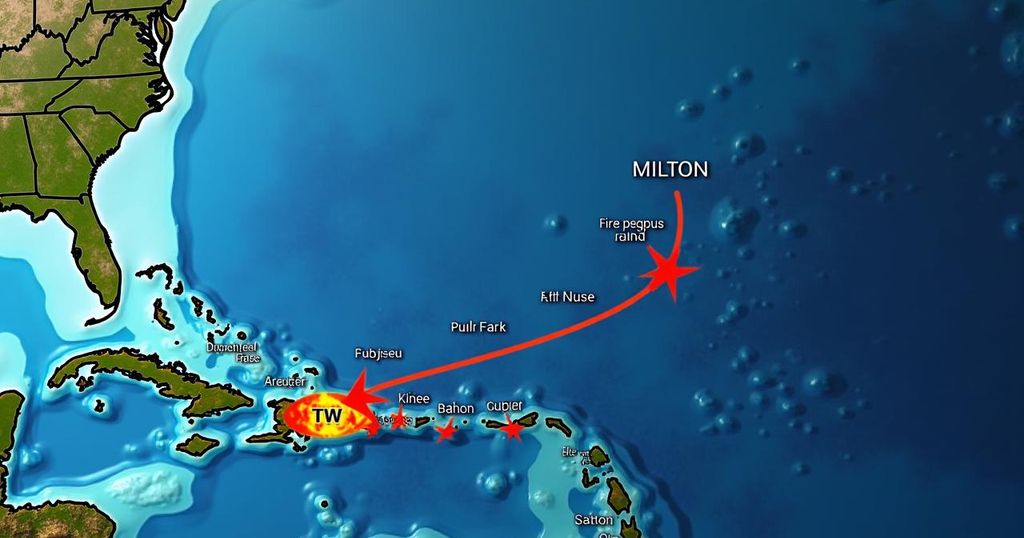Tropical Storm Milton has formed and is projected to impact Florida by Wednesday with hurricane-strength winds and rain. It is the 13th storm of the season and may have impacts extending beyond its landfall point. Milton’s potential as a hurricane follows recent devastation caused by Hurricane Helene, highlighting serious flooding and storm surge risks during peak hurricane season.
Tropical Storm Milton has emerged as the 13th named storm of the hurricane season and is currently tracking across the Gulf of Mexico. According to the National Hurricane Center, this storm is predicted to impact Florida with hurricane-strength winds and significant rainfall by Wednesday. The potential effects of Milton may extend far beyond its point of landfall, affecting regions both north and south of the storm’s center. If Milton intensifies and makes landfall as a hurricane, it would mark the second hurricane to strike Florida in a short span, following Hurricane Helene, which recently devastated areas with record-high storm surges and contributed to over 220 fatalities along its path from Florida to Virginia. A tropical cyclone transforms into a hurricane when it encounters proper environmental conditions over a sustained period. Meteorologists define a tropical storm once its winds maintain a speed of 39 mph for at least one minute; at 74 mph, the storm escalates to a Category 1 hurricane and continues through the Category 5 designation. These classifications assist officials in forecasting the potential risks associated with the storm, helping them to issue proper warnings concerning the severe winds, elevated waves, and flooding that may ensue upon landfall. The presence of tropical storm-force winds can be perilous, while hurricane-force winds pose even greater threats, endangering structures and propelling debris. Storm surges, or anomalous rises in seawater levels, are responsible for a significant number of hurricane-related fatalities in the United States, according to the National Weather Service. Alongside the risk of storm surge, heavy rainfall associated with these storms can lead to severe inland flooding, often overwhelming local drainage capabilities and causing flash floods that may persist long after the storm has departed. The hurricane season is historically most intense around mid-September, and this year, the National Oceanic and Atmospheric Administration anticipates a particularly active season with 17 to 25 tropical storms forecasted, of which four to seven may escalate to major hurricanes.
The phenomenon of hurricanes and tropical storms is a crucial subject of research due to their profound implications on human life and infrastructure. Understanding how these storms form, intensify, and their potential impacts is vital for preparedness and response efforts. Tropical Storm Milton exemplifies this need, as it poses a credible threat to coastal areas and underscores the importance of meteorological vigilance. The ongoing hurricane season has raised concerns among authorities, especially following the devastating impacts of Hurricane Helene, which has redefined the scale of devastation in recent years. Meteorological studies indicate an increase in the duration and severity of hurricanes, stressing the need for comprehensive disaster management strategies.
In conclusion, Tropical Storm Milton represents a significant meteorological event with the potential for widespread impacts across Florida. As it progresses across the Gulf of Mexico, careful monitoring and timely warnings are essential to mitigate risks associated with wind, flooding, and storm surges. The recent trends observed in hurricane intensity and duration necessitate an increased focus on preparedness measures for communities that may be affected by such storms. As the hurricane season continues, the importance of understanding and responding to these weather events remains paramount.
Original Source: www.washingtonpost.com






